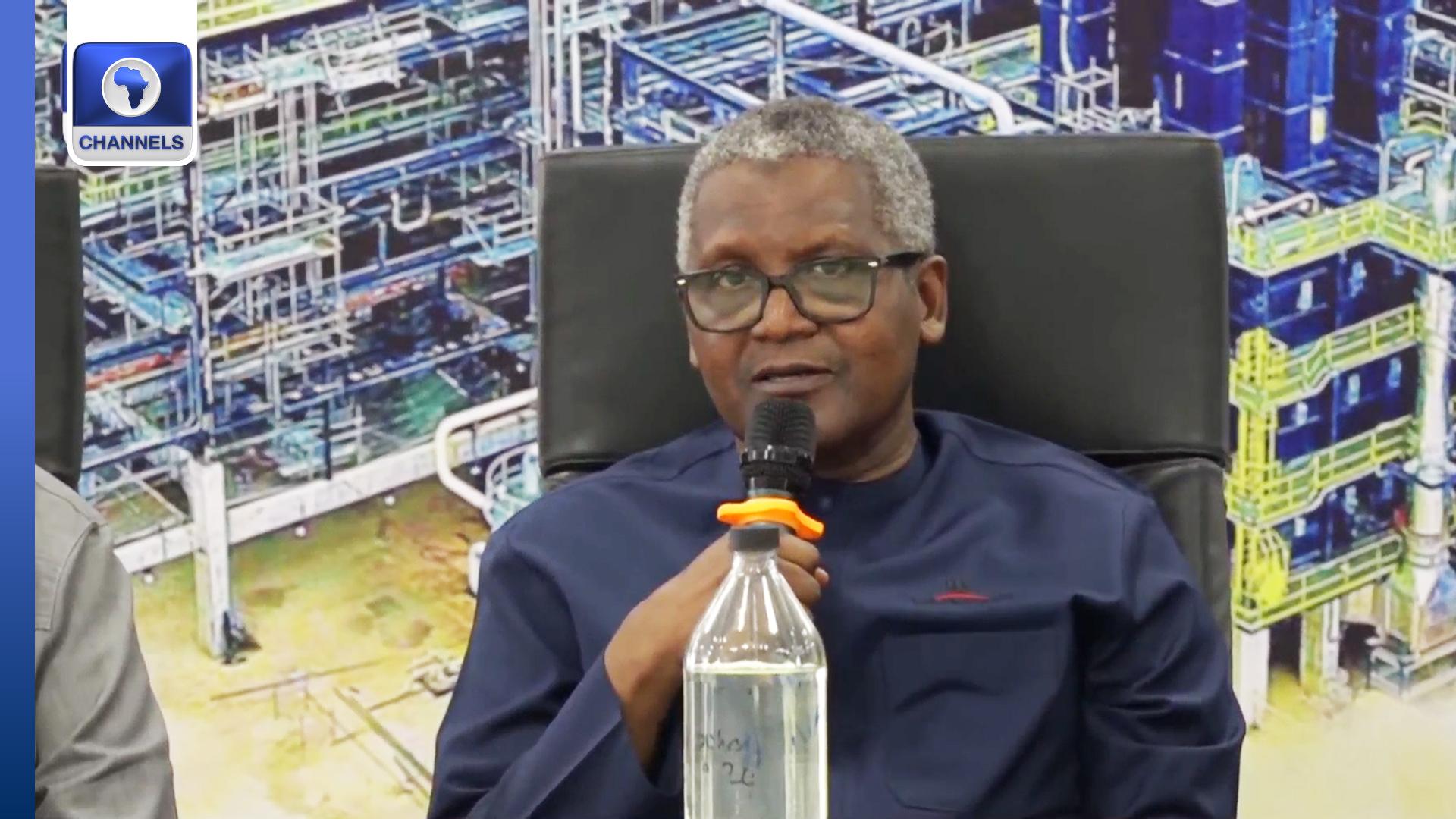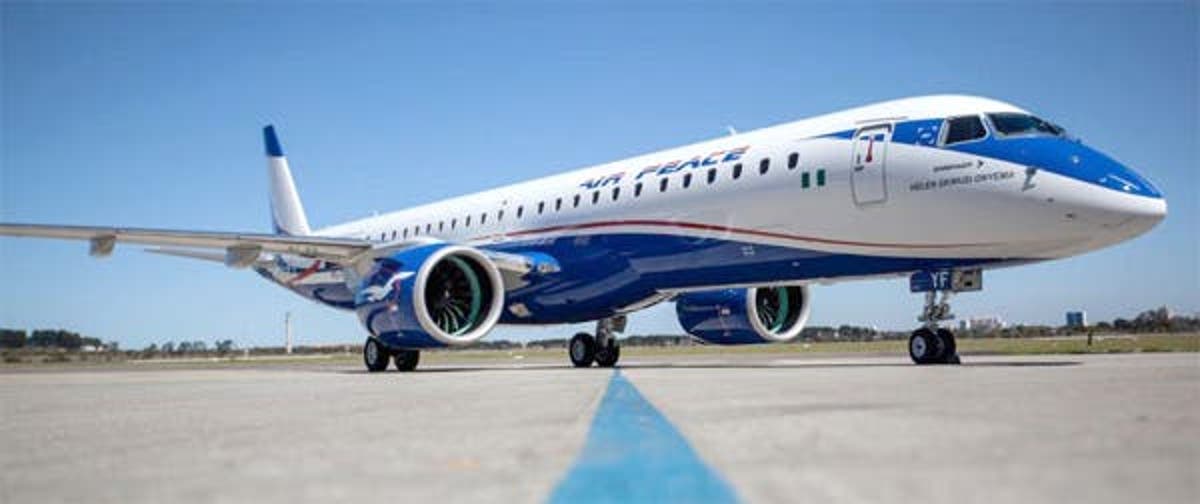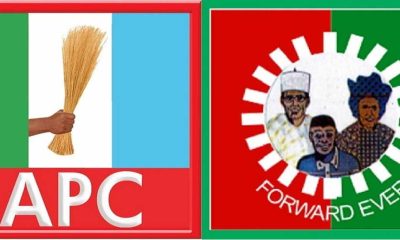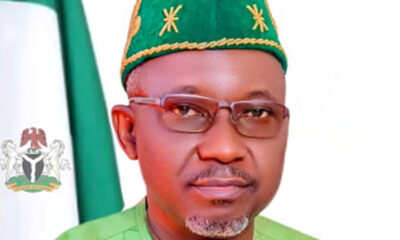Business
Naira records major gain against dollar, sells for N680/$

The naira on Saturday recorded a major gain against the dollar, closing at N680/$ at the parallel market in a new wave of sustained recovery after weeks of depreciation.
The recovery of the local currency is linked to ease in dollar demand and release of huge dollars by forex speculators who wanted to take advantage of previous rate spike in the market.
The naira, which nearly hit N900/$ early last week, made a major comeback after the Central Bank of Nigeria (CBN) also injected unspecified volume of dollars into the market to boost liquidity.
At the Investors and Exporters Forex (I&E) Window- now the official market rate- the naira is quoted at N441.46/$, data on the CBN website showed. The local currency has been stable at this window used for official transactions, but bulk of retail transactions happen at the parallel market.
Hasssan Abdul, a bureau de change operator based in Ikeja, Lagos, said the volatility in the market has subsided and stability gradually returning, with speculators transacting more cautiously to avoid losses.
READ ALSO:
- INEC opens portal for preliminary display of voters’ register
- Five gunmen killed as security operatives repel attack on checkpoint in Anambra
- Obi cautions supporters, LP candidates against insulting others
Hasssan Abdul, a bureau de change operator based in Ikeja, Lagos, said the volatility in the market has subsided and stability gradually returning, with speculators transacting more cautiously to avoid losses.
He said the clampdown on illegal BDC operators by the Economic and Financial Crimes Commission (EFCC) has also helped to bring stability to the market.
“Dollar to Naira exchange rate in Nigeria black market is N680/$, according to 16 sell rates shared by the traders. The coming weeks will be difficult as more businesses resume demand for dollars to import goods for end of year sales,” he said.
Analysts estimate that currency speculators will lose at least N10 billion in the coming months if they continue betting with their capital against the naira.
Forex Dealer with AZA Finance, Ikenga Kalu, said naira recovery followed decline in rush to convert soon-to-be-abolished high-value naira notes into dollars.
He said: “While Nigerian Bureaux de Change operators have confirmed reduced demand at current parallel market levels, we expect dollar appetite to pick up again in the coming days and the Naira to resume its recent slide.”
Global Chief Economist at Renaissance Capital (RenCap), Charles Robertson, said Nigeria is in a difficult position and needs to increase its dollar earnings and other revenue to support the naira.
He said Nigeria should hike taxes, raise more revenue as the country’s current position is so bad that it has never been witnessed in the last three decades.
Robertson, who is also RenCap’s Head Macro-strategy Unit, added: “Things are not looking pretty good for Nigeria and other emerging markets. Oil production in Nigeria has fallen so badly in the last few years and oil price is also about falling more. We are going to see disinflationary policies coming because we are approaching recession,” he said.
Managing Director, Financial Derivatives Company Limited, Bismarck Rewane, said the naira is falling on the back of heightened forex demand compared to limited forex supply.
He said: “Nigerian consumers, businesses and individuals alike are facing challenges and headwinds and are reeling in an atmosphere of hopelessness. This is because of a myriad of factors.
“Notably, the precipitous fall of the naira in the forex market, the power supply shortage and now the almost unaffordable price of diesel.
“In spite of the hike in interest rates, we are witnessing what some analysts fear may become a bout of runaway inflation. Inflation is not just domestic but global.”
Managing Director, Cowry Asset Management Limited, Johnson Chukwu, said that to save the naira, Nigeria needs to build an economy that is net exporter of valuable goods and services to earn more dollars.
The EFCC has also cautioned Bureaux de Change (BDCs) against abuse of regulatory guidelines in selling dollars at the retail end of the market.
READ ALSO:
- Portable Impregnates Another ‘Side Chick’, Set For Marriage
- We Are Not Recruiting, Avoid Fraudsters, WAEC Warns
- UK hails Russian ‘strategic failure’ in Ukraine
The warning came after the Central Bank of Nigeria (CBN) policy on redesigning N200, N500 and N1,000 bank notes was announced by the regulator.
In a statement, Association of Bureaux De Change (ABCON) National Executive Council, said the EFCC advised all licenced BDCs to be extremely careful in their day-to-day operations by requesting customers’ information during transactions.
The agency advised BDCs not to be involved in cash couriers, which remains serious infraction that can lead to prosecution of perpetrators.
“The BDCs are also advised to render regulatory returns. They are the gate keepers to the economy and their directors will be keenly monitored by the CBN and security agencies,” it said.
The CBN had previously warned domestic and foreign investors against patronising the parallel market, saying it was helping to overheat that market.
CBN Governor, Godwin Emefiele, warned firms and individuals against patronising the parallel market which he said was helping to overheat the foreign exchange market.
False flag spooks BDCs to dump dollars
A social media false flag could be responsible for the good fortunes of the Naira as it currently trades against the dollar.
Nura, a Forex trader at the popular Wuse Zone 4 Forex market, painted two scenarios that could be responsible for the appreciation of the Naira to the dollar.
He initially admitted that they (forex traders) were just as surprised as other Nigerians at the sudden rise in the value of the Naira.
“We are also surprised at the way the Naira quickly appreciated. As a trader this development came as surprise,” he said.
Nura told The Nation that forex dealers were spooked by social media reports that the United States of America (USA) was planning to restrict the use of dollar notes printed before 2021 to frustrate those hoarding the greenback from January 31, 2023.
While this information is absolutely false, Nura said people in their trade take news from the social media seriously.
Many Forex traders in Abuja, he said, “are aware that the story is false, but they are not willing to take chances. As a result, many of them are disposing of the “old” dollar notes that they have.”
As at 5pm on Friday when Nura spoke with The Nation, the Naira was trading at N670 to the dollar.
The projected change in Pounds Sterling (the gradual removal of the image of the late Queen to be replaced with the image of King Charles lll), Nura said “is already affecting BDCs. Nigerians who stashed Pounds Sterling now want to bring them out. We are happy Naira is appreciating.”
READ ALSO:
- Policeman who rejected $200,000 bribe gets promotion, cash reward
- Lagos suspends BRT enforcement on Eko Bridge for rehabilitation
- UNILAG-Nord auto plant partnership excites FG, Mamora offers support
Senator Shehu Sani on twitter corroborated what Nura said when he posted: “Forex dealers are insisting that Naira appreciated against the Dollar not because of any CBN intervention but because of the alleged threat by the US against the hoarding of the Dollar in Nigeria.”
Pressed further that the false flag was not enough to cause such drastic change in the value of the Naira, Nura also stated that “the government and the Central Bank of Nigeria (CBN) had a hand in the sudden spike in the value of the Naira.
According to Nura, “there is something happening between the government, the CBN and the NNPC. It looks like Nigeria is selling more oil and they pay cash not transfer. CBN has more dollars now.”
Nura also said that Wuse Zone 4 Forex traders have notice that “some people are coming to buy dollars with old Naira notes” in order to convert their Naira to dollars.
An Economist, Dr Chijioke Ekechukwu, MD/CEO Dignity Finance and Investment Ltd, in a chat with The Nation, said “the spontaneous rise of the exchange rate following the announcement of CBN Governor on their plan to redesign the Naira was expected.
“This was for speculative reasons and for reasons of market reaction to the demand that ensued.”
He said Naira notes “that were stacked in billions in homes and offices could not have been taken to the banks for deposit, for fear of EFCC and cumbersome nature of such processes. The only alternative was for them to quickly buy foreign currencies to avoid the banks.
“This led to a demand pull rate hike. Speculators also followed immediately to sweep the forex market of any available foreign currency.”
Dr. Ekechukwu noted that “the only measure that was to reverse the trend was any distortion on Naira supply, which happened when EFCC went in to check black market players, which put them on check and reduced sale of FX”.
He added that “the drop in the rate is expected to be temporary. Towards the end of the year, we expect to experience another spike as demand increases again.
“The foreign currencies bought at high exchange rate, up to N850 per Dollar, by the black market dealers will obviously be sold higher than they bought them,” he said.
“Right now they are stockpiling them, hoping to sell at higher rates later in the year. So rates are expected to react to absorb such highly priced FX already in their books.”
Business
I’m honoured, excited over World Bank’s appointment – Dangote

I’m honoured, excited over World Bank’s appointment – Dangote
President and CEO of Dangote Group, Aliko Dangote, has expressed gratitude following his appointment to the World Bank’s Private Sector Investment Lab, a global initiative aimed at accelerating private investment and job creation in emerging economies.
In a statement confirming the development, Dangote described the appointment as both an honour and a reflection of his long-standing commitment to economic development through private enterprise.
“I am both honoured and excited to accept my appointment to the World Bank’s Private Sector Investment Lab, dedicated to advancing investment and employment in emerging economies,” Dangote said.
“This opportunity aligns with my long-standing commitment to sustainable development and unlocking the potential of developing economies.”
He referenced the successes of the so-called Asian Tigers, economies that experienced rapid growth through strategic investment, as a source of inspiration for advancing similar outcomes in other parts of the world.
The World Bank announced Dangote’s inclusion on Wednesday as part of a broader expansion of the Lab, which enters a new phase focused on scaling up solutions that attract private capital and generate employment in developing countries.
Other newly appointed members include Bill Anderson, CEO of Bayer AG; Sunil Bharti Mittal, Chairman of Bharti Enterprises; and Mark Hoplamazian, President and CEO of Hyatt Hotels Corporation.
READ ALSO:
- Akpabio to represent Tinubu at Pope Francis funeral
- PDP will come out stronger, Saraki reacts to Okowa, Delta gov defection
- Countries eligible to enter US without visas for 90days (full list)
World Bank Group President Ajay Banga noted that the expanded membership underscores the institution’s focus on integrating private-sector leadership into its strategy for global job creation.
“With the expanded membership, we are mainstreaming this work across our operations and tying it directly to the jobs agenda that is driving our strategy,” Banga said.
“This isn’t about altruism—it’s about helping the private sector see a path to investments that will deliver returns, and lift people and economies alike. It’s central to our mandate.”
The lab, which was co-chaired in 2023 by Canadian Prime Minister Mark Carney, previously sought to mobilise £1 trillion in sustainable investment, particularly targeting energy transition projects in emerging markets.
Aviation
Air Peace suspends flights nationwide over NiMet strike

Air Peace suspends flights nationwide over NiMet strike
Air Peace has suspended all its flight operations across the country due to the ongoing strike by the Nigerian Meteorological Agency (NiMet).
The airline said in a statement on Wednesday that it was also suspending operations due to the unavailability of QNH (hazardous weather) reports required for safe landings.
“Due to the ongoing NiMet strike and the unavailability of QNH (hazardous weather) reports required for safe landings, Air Peace has suspended all flight operations nationwide until the strike is over,” Air Peace said.
“Your safety is our top priority. We appreciate your understanding and will share updates as the situation unfolds.”
The airline had earlier announced that the NiMet strike could lead to flight delays and cancellations across its network.
Air Peace added that it was monitoring the situation and working with relevant stakeholders to minimise the impact on customers’ travel plans.
Employees of NiMet commenced a nationwide indefinite strike over welfare issues on Wednesday.
Some of the issues raised involve “NiMet’s refusal to negotiate or implement agreed financial allowances and unresolved entitlements,” including wage awards, peculiar allowances, and outstanding payments from the 2019 minimum wage.
They also accused the management of the agency of withholding important documents, ignoring requests for inclusion of omitted staff in past payments, and neglecting key training programmes in favour of executive retreats.
Business
Nigeria’s gas production increases by 15.6% to 227,931.65 mscf

Nigeria’s gas production increases by 15.6% to 227,931.65 mscf
Nigeria’s gas output has increased 15,6 percent month-on-month, MoM, to 227,931.65 million standard cubic feet, mscf, in March 2025.
But on year-on-year, YoY basis, the nation’s gas output recorded a marginal increase to 227,931.65 mscf in March 2025, from 198,353.62 mscf, recorded in the corresponding period of 2024.
Data obtained from the Nigerian Upstream Petroleum Regulatory Commission, NUPRC, Gas Production Status reports indicated that of the total of 227,931.65 mscf produced in March 2025, 119,552.75 mscf was associated while 108,378.90 mscf was non-associated gas.
Associated gas is extracted in the process of producing crude oil while non-associated gas is produced without crude oil after much investment, exploration and development.
The Ministry of Petroleum Resources (Gas), which is directly involved in the development of policies, targeted at increasing investment in the sector said efforts have been made to increase investment and production of gas in Nigeria.
Similarly, in its recent report obtained by Vanguard, the Nigerian LNG Limited stated: “We are fully committed to expanding our operations with the NLNG Train 7 Project, which will boost our production capacity by 35%, increasing from 22 Million Tonnes Per Annum (mtpa) to 30 mtpa. This project underscores our role as a key player in the global LNG market and positions Nigeria as a top-tier supplier of LNG, leveraging its vast proven gas reserves of 202 trillion cubic feet (the 9th largest globally).
Vanguard
-

 metro16 hours ago
metro16 hours agoOmokri : How Tinubu’s political mastery started with Abiola, says El-Rufai, Obi’s forces can’t stop him
-

 metro3 days ago
metro3 days agoI’m not in supremacy battle with Ooni, says new Alaafin
-

 Education9 hours ago
Education9 hours agoJAMB officials seize candidates’ hijab at Caleb varsity, Muslim students kick
-

 Entertainment2 days ago
Entertainment2 days agoP-Square: Jude Okoye freed after two months detention
-

 International9 hours ago
International9 hours agoUS releases 41 countries granted 90-day entry without visas (full list)
-

 Politics2 days ago
Politics2 days agoLabour Party collapses into APC in Plateau
-

 Business3 days ago
Business3 days agoNigeria’s gas production increases by 15.6% to 227,931.65 mscf
-

 metro2 days ago
metro2 days agoNiger Gov Bago makes U-turn on dreadlocks ban after backlash











